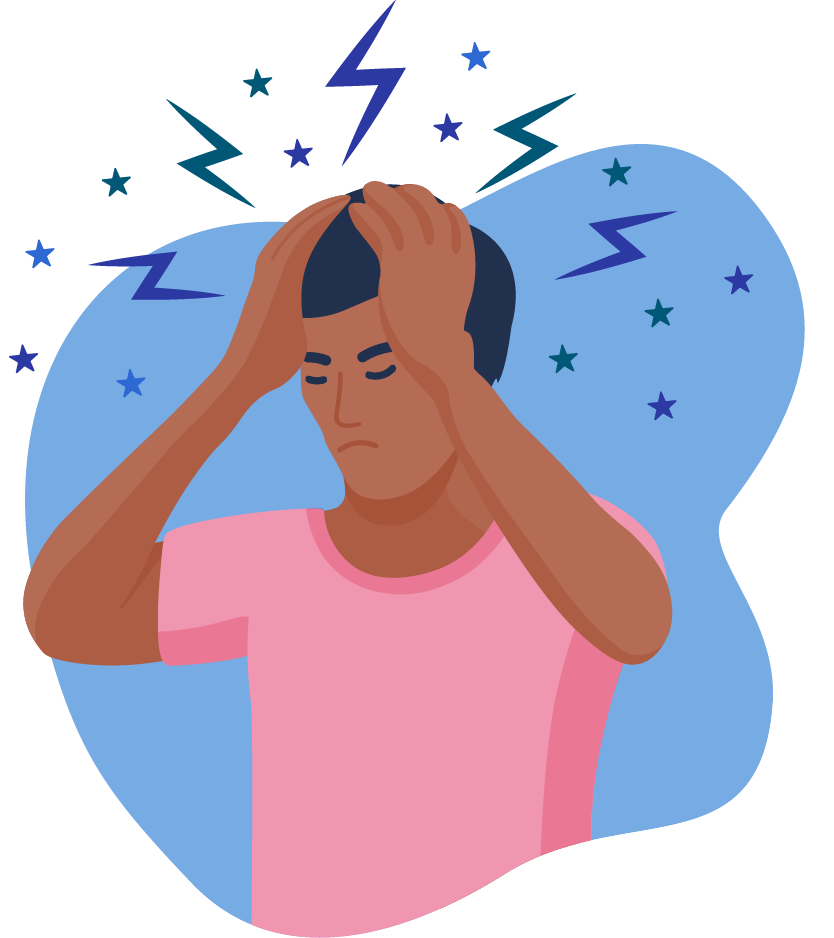Exploring Treatment Options for Chronic Migraine
12 Articles




Have you ever felt a moment so eerily familiar that it seems like you’re living it again? This strange sensation, known as déjà vu, is an experience almost everyone has at least once.
Members of MyMigraineTeam have described the feeling of déjà vu, and some wonder if it’s related to migraine.
“I used to get déjà vu as a kid and young adult. I found it disorienting and frightening. I’d get a tingly shock sensation and a sense of danger,” one member recalled. “I wasn’t diagnosed with migraines until I was 16. I suspect it was a hormone shift. I never associated déjà vu with migraine until now, but I did wake up with bad headaches as a young child.”
Here’s what might be happening in your brain during déjà vu and what that could mean if you’re living with migraine.
Déjà vu is an example of how the brain can create the illusion of familiarity. The sensation is thought to occur due to mixed signals and electrical activity dysfunction in the brain. During déjà vu, parts of the brain responsible for memory may become activated when they shouldn’t, making something feel familiar — even though it’s really not.
Researchers aren’t sure what triggers déjà vu, but experiencing it once or twice a year is considered normal. Déjà vu tends to occur more often on weekends or in the evening than during a typical weekday. People who travel frequently or remember their dreams are more prone to déjà vu, though researchers aren’t sure why. Déjà vu is also more common in adolescents and young adults and usually happens less with age.
In rare cases, déjà vu may be linked to migraine or a neurological disorder such as dementia (memory problems), or seizures. If you notice a sudden increase in déjà vu episodes or they occur with symptoms like fainting, loss of consciousness, or a sense of panic, be sure to speak with your health care provider. Stress and exhaustion also raise the likelihood of experiencing déjà vu.
Since déjà vu is so common, people with migraine experience it just like everyone else. Sometimes déjà vu may have nothing to do with migraine, but other times, it may occur as part of a migraine aura.
A migraine aura refers to changes in vision and other senses that some people experience before or during a migraine attack. Typical visual symptoms include blind spots and flashes of light, and some people have tingling in the hands or face. Auras are thought to be caused by abnormal electrical activity, sometimes affecting a small area in one side of the brain. This kind of activity can also occur during a type of seizure called a partial seizure, also known as a simple focal seizure.
There isn’t a lot of research on déjà vu and migraine, but one small study involving 40 teenagers with migraine found that 22.5 percent reported déjà vu as an aura symptom.
Several members of MyMigraineTeam have discussed déjà vu and auras. “The déjà vu is just like trying to remember what I’m trying to remember, if that makes sense. The confusion and detached feelings, then panic. I also see zigzag lines a little later,” one member wrote.
“The first day, I get the déjà vu, and I’ll have it one to six times until I throw up,” reported another member. “The second day, the migraine comes, and I have really intense déjà vus that continue in waves throughout the day. This continues for a couple of weeks, but the intensity decreases each day.”
“I sometimes get a sort of déjà vu. It starts with having a memory of a dream, but I can’t remember it properly. It’s like chasing an elusive butterfly,” shared a third member. “Another similar aura is having a memory of an event that has just happened but then becoming unsure if it did happen or not. Eventually, it becomes so frequent that I don’t know what’s real. From there, I became really ill. My heart sinks when I realize what is happening because I know I’m in for a rough ride.”
Members have also said déjà vu happens during sleep or when waking up. “I get the déjà vu in my sleep, wake up with the déjà vu (it’s really intense),” reported one member. “Often, I have excess saliva or nausea and vomiting. Soon after the déjà vu, I experience severe headache (migraine).”
“That's so me! I tend to wake up to a migraine attack. My mouth is watering, and I throw up,” another member responded. “I also sweat really badly, so when it’s cooler out, I will go out back and just pace up and down my yard. Eventually, I can lie back down after my cocktail of meds. It takes time to go to sleep, but I do. Sometimes, I get them under control in a couple of hours, or they can last a couple of days.”
Hearing how other people with migraine experience déjà vu can help you connect the dots in your case. By learning to recognize this potential sign of migraine, you can seek medical advice and treatment sooner.
If your neurologist finds that your déjà vu stems from partial seizures, they may prescribe anti-seizure medications. In more severe cases, they may recommend surgery or an implanted device called a vagus nerve stimulator.
Tell your headache specialist if you’re having any sensory symptoms, including déjà vu. They can screen for underlying seizure disorders or make recommendations to help reduce your migraine symptoms.
On MyMigraineTeam, the social network for people with migraine and their loved ones, more than 83,000 members come together to ask questions, give advice, and share their stories with others who understand life with migraine.
Do you experience déjà vu as a warning sign of migraine headaches? Have you noticed a change in déjà vu or other clinical features of auras after starting migraine therapies? Share your experience in the comments below, or start a conversation by posting on your Activities page.

Are your headaches a symptom of migraine? Get a quick assessment.
 Angelica Balingit, M.D.
is a specialist in internal medicine, board certified since 1996.
Learn more about her here.
Angelica Balingit, M.D.
is a specialist in internal medicine, board certified since 1996.
Learn more about her here.
 Anastasia Climan, RDN, CDN
is a dietitian with over 10 years of experience in public health and medical writing.
Learn more about her here.
Anastasia Climan, RDN, CDN
is a dietitian with over 10 years of experience in public health and medical writing.
Learn more about her here.
Get updates directly to your inbox.
 Featured Channel
Featured Channel
Exploring Treatment Options for Chronic Migraine
12 Articles



Become a member to get even more:




We'd love to hear from you! Please share your name and email to post and read comments.
You'll also get the latest articles directly to your inbox.